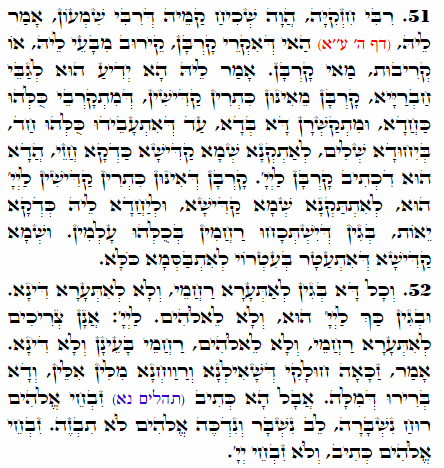Daily Zohar # 2391 – Vayikra – Bring your sacrifice closer to God
Daily Zohar 2391
Daily Zohar 2391

.
Hebrew translation:
52. וְכָל זֶה כְּדֵי לְעוֹרֵר רַחֲמִים וְלֹא לְעוֹרֵר דִּין. וּמִשּׁוּם כָּךְ לַה’ הוּא, וְלֹא לֵאלֹהִים. לַה’ – אָנוּ צְרִיכִים לְעוֹרֵר רַחֲמִים, וְלֹא לֵאלֹהִים. אָנוּ רוֹצִים רַחֲמִים וְלֹא דִין. אָמַר, אַשְׁרֵי חֶלְקִי שֶׁשָּׁאַלְתִּי וְהִרְוַחְתִּי אֶת הַדְּבָרִים הַלָּלוּ, וְזֶהוּ בֵּרוּר הַדָּבָר. אֲבָל הֲרֵי כָּתוּב,(תהלים נא)זִבְחֵי אֱלֹהִים רוּחַ נִשְׁבָּרָה לֵב נִשְׁבָּר וְנִדְכֶּה אֱלֹהִים לֹא תִבְזֶה. זִבְחֵי אֱלֹהִים כָּתוּב, וְלֹא זִבְחֵי ה’.
.
Zohar Vayikra
Note:
The name YHVH יהוה, normally translates in English to ‘the Lord’. It represents mercy, Zeir Anpin and central column. The name ELOHIM, אלהים, normally translates to ‘God’. On the Daily Zohar, I usually use ‘God’ for both when the reference is general. In the English translations I change ‘the Lord’ to YHVH and leave ‘God’ as is.
The name ‘God’ Elohim אלהים, is the name that represents the act of Creation. It appears 32 times in during the story of Creation. It’s the aspect of the Left, Gevurah and judgment.The name YHVH appears a little later in the Torah.
Leviticus 1:2
“דַּבֵּר אֶל-בְּנֵי יִשְׂרָאֵל, וְאָמַרְתָּ אֲלֵהֶם, אָדָם כִּי-יַקְרִיב מִכֶּם קָרְבָּן, לַיהוָה–מִן-הַבְּהֵמָה, מִן-הַבָּקָר וּמִן-הַצֹּאן, תַּקְרִיבוּ, אֶת-קָרְבַּנְכֶם”
“Speak to the sons of Israel and say to them, ‘When any man of you brings a sacrifice to YHVH, you shall bring your offering of animals from the herd or the flock.”
The Zohar explains that the word קרבן (Pronounced ‘Korban’), ‘Sacrifice’ with the root ‘קרב’ means ‘coming closer’. The sacrifice that a person brings to the priests in the Holy Temple creates unification of Zeir Anpin and the upper three Sefirot. It completes the name YHVH that is the aspect of mercy and central column.
Another aspect of sacrifice is called ‘זבח’ (pronounced ‘Zevach’, ‘Zevaj’). King David tells us that God listen to a broken heart and remove judgments from that person.
Psalms 51:19
“זִבְחֵי אֱלֹהִים, רוּחַ נִשְׁבָּרָה:
לֵב-נִשְׁבָּר וְנִדְכֶּה– אֱלֹהִים, לֹא תִבְזֶה”
“The sacrifices of God are a broken spirit; A broken and a contrite heart, O God, You will not despise.”
{||}

 Previous: Vayikra
Previous: Vayikra

